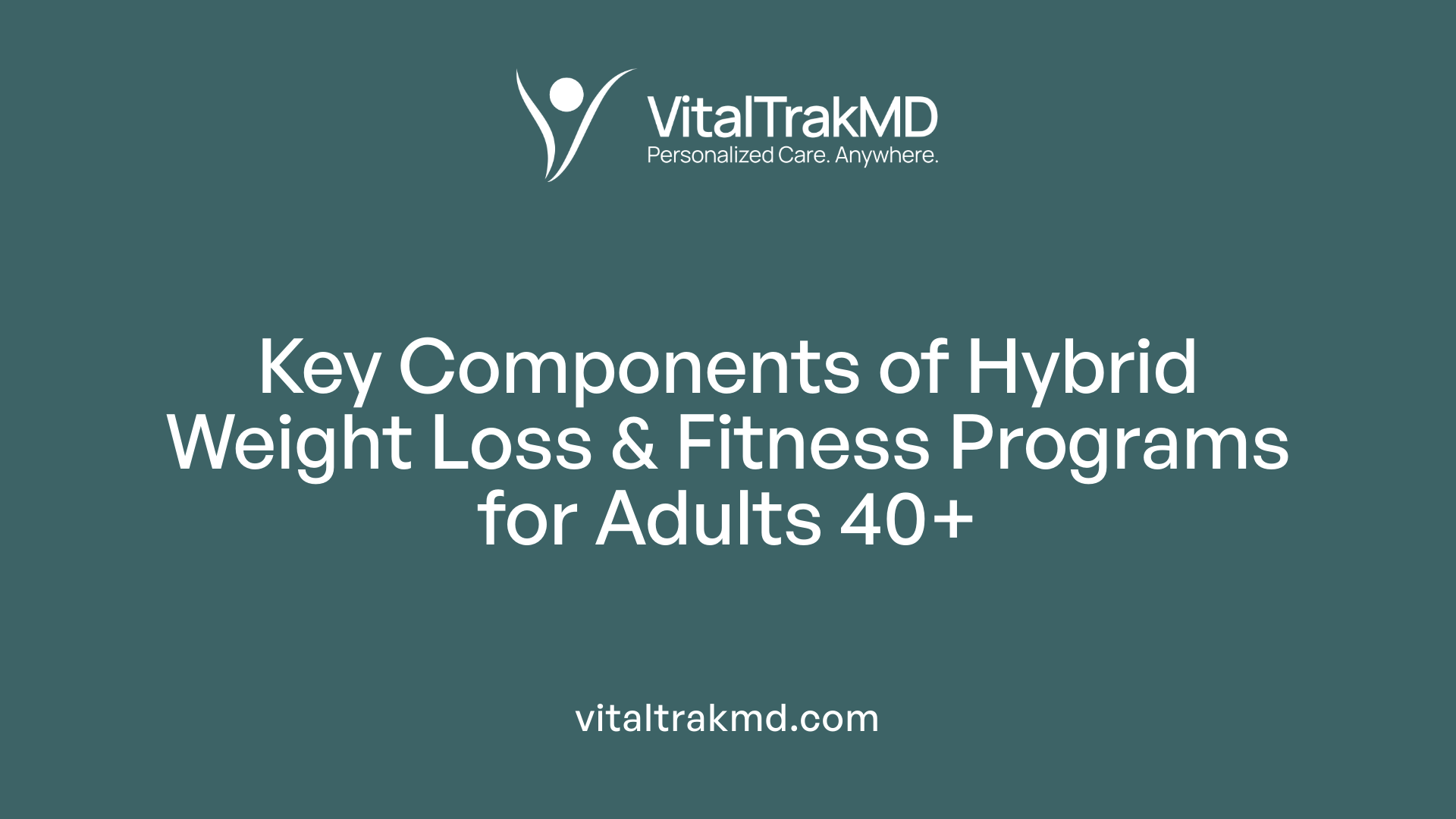Hybrid Weight Loss Programs Tailored for Adults 40+

Understanding the Growing Need for Tailored Weight Program Solutions
As the global population ages, the importance of specialized weight management strategies for adults over 40 becomes increasingly evident. These programs address unique physiological, metabolic, and lifestyle challenges faced by this age group, emphasizing a blend of traditional and modern techniques to foster sustainable health improvements.
Core Components of Hybrid Weight Loss and Fitness Programs for Adults 40+

What are the key components and strategies of hybrid weight loss and fitness programs for adults over 40?
Hybrid programs designed for adults over 40 often blend face-to-face coaching with digital tools like mobile apps, online platforms, and telehealth services. These initiatives aim to promote weight loss, improve physical health, and maintain long-term wellness.
Resistance training and mobility routines are fundamental, focusing on strength exercises that preserve or increase muscle mass while preventing injuries. These routines also include mobility work to enhance flexibility and joint health, which are especially important with aging.
Cardiovascular activities in these programs are tailored for age-related considerations. Options might range from moderate, sustained exercises such as brisk walking or cycling to high-intensity interval training (HIIT), adapted in intensity and duration to suit individual fitness levels. The goal is to improve cardiovascular health while minimizing stress on joints.
Gradual progression and injury prevention are vital to ensure safety and consistent improvement. Programs incorporate micro-loading—small increases in exercise intensity—and recovery strategies, including adequate rest and mobility sessions. Proper form and technique are emphasized, often with coaching feedback.
Behavior change and motivation tools support long-term adherence. Many programs incorporate behavioral strategies based on theories such as Social Cognitive Theory, aiming to boost motivation, set realistic goals, and foster healthy habits. Tools like goal-setting, self-monitoring, and peer support are common.
Technology integration enhances tracking and engagement. Wearable devices, mobile apps, and online portals enable users to monitor their progress, receive immediate feedback, and stay motivated through reminders and community features.
These elements collectively lead to improved muscle mass, metabolic health, flexibility, and endurance. They aim to sustain health, functional independence, and overall quality of life, addressing unique challenges faced by adults over 40, such as hormonal changes, sleep disturbances, and stress.
For further insight, searching "hybrid weight loss fitness programs adults over 40" reveals a growing field of tailored, evidence-based approaches designed to meet these specific needs.
Evidence-Based Benefits and Outcomes of Weight Management Programs in Adults Over 40
Several studies highlight the positive results of tailored weight management programs for adults over 40. These programs typically result in notable weight loss, with averages ranging from approximately 3.9 to 8.2 kilograms over various durations. A consistent outcome is the reduction in BMI, averaging about 0.58 kg/m², along with decreases in waist circumference, which collectively contribute to better health.
Beyond weight reduction, these programs help lower the risk of chronic health issues such as type 2 diabetes and heart disease. Improving metabolic markers and encouraging healthy behaviors are central to these benefits. The integration of digital tools such as mobile health apps, email support, and telehealth consultations boosts engagement, making it easier for participants to adhere to their plans.
Evidence also suggests that programs combining dietary counseling, physical activity, and behavior change strategies—especially when delivered through a mix of face-to-face and digital formats—are effective. They tend to sustain results longer and improve retention. For instance, some interventions encourage at least 150 minutes of moderate aerobic exercise weekly, which further reduces body fat and waist size.
Overall, multicomponent interventions that include education, behavioral support, and physical activity, often guided by health theory, show promising results for health improvement and long-term weight management in adults over 40.
Effective Exercise Routines and Lifestyle Changes for Adults Over 40
 Maintaining or losing weight in adults over 40 requires a combination of tailored exercise routines and lifestyle adjustments.
Maintaining or losing weight in adults over 40 requires a combination of tailored exercise routines and lifestyle adjustments.
Recommended aerobic activity levels include at least 150 minutes of moderate-intensity exercise weekly. Activities such as brisk walking, cycling, swimming, or dancing are excellent choices. Breaking down this time into sessions spread across the week helps keep the routine manageable and sustainable.
Strength training is crucial to preserve muscle mass and prevent age-related bone density loss. Adults should aim for strength exercises at least two times a week. These can include body-weight movements, resistance band work, or light dumbbell routines, adjusted to individual comfort and ability.
Flexibility and balance exercises help maintain mobility and prevent falls. Incorporate stretching sessions, yoga, or Tai Chi into your weekly schedule. Even short daily sessions can improve flexibility, reduce stiffness, and enhance overall stability.
Lifestyle habits such as dietary and sleep routines play a vital role in weight management. Focus on a balanced diet rich in proteins, vegetables, and whole grains while reducing processed foods. Staying well-hydrated and prioritizing sufficient sleep—generally 7-9 hours per night—support metabolic health.
Gradual changes and consistency are essential. Increase exercise intensity and duration slowly to avoid injury, and consult healthcare providers before making significant shifts in activity. Choosing activities that are enjoyable increases the likelihood of sticking with the routine long-term.
Research shows that combining these physical activity strategies with healthy lifestyle habits can lead to significant benefits. For example, programs like the Michigan Medicine Weight Management Program and Reverse Health for women over 40 illustrate the effectiveness of comprehensive, personalized approaches to weight control and health maintenance.
Determining Eligibility and Research Opportunities in Weight Management
 Adults over 40 interested in weight management programs or research opportunities should start by consulting their healthcare providers. Medical professionals can evaluate overall health, identify any underlying conditions, and help determine which types of interventions are suitable. For example, programs tailored to women over 40, like Reverse Health, focus on hormonal changes and include diet, exercise, and lifestyle adjustments that consider aging-specific needs.
Adults over 40 interested in weight management programs or research opportunities should start by consulting their healthcare providers. Medical professionals can evaluate overall health, identify any underlying conditions, and help determine which types of interventions are suitable. For example, programs tailored to women over 40, like Reverse Health, focus on hormonal changes and include diet, exercise, and lifestyle adjustments that consider aging-specific needs.
In addition to clinical consultation, many community and academic programs seek older adults for research studies. Universities often run longitudinal studies, such as the Baltimore Longitudinal Study of Aging, which include health and nutrition assessments pertinent to weight management. These studies typically have specific criteria, like age, health status, or geographic location, and often require participants to undergo health screenings.
Programs like the Older Adult Research Specialist (OARS) offer training and opportunities for community members to participate in aging research. Such initiatives aim to better understand the health challenges faced by older adults and develop appropriate strategies for weight and health management.
Community organizations and Extension services supported by agencies like the National Institute of Food and Agriculture (NIFA) also provide education and support. These programs often include workshops on healthy aging, nutritional guidance, and physical activity recommendations.
To find local opportunities, adults can visit clinics, university research centers, or community health programs. Searching online with keywords like "eligibility research weight management adults over 40" can help locate studies suited to individual circumstances. Participation in these programs can provide personalized guidance and contribute to advancing scientific knowledge.
Overall, by combining medical advice and exploring specialized research initiatives, adults over 40 can access tailored weight management options and contribute to aging health research.
Common Challenges and Tailored Solutions for Adults Over 40 in Weight Loss
What are common weight loss challenges faced by adults over 40, and what tailored solutions can address these issues?
Adults over 40 often encounter several obstacles in their weight loss journey. One of the primary issues is a slowing metabolism, which reduces the number of calories burned at rest. This physiological change can make shedding excess weight more difficult. Additionally, hormonal shifts—such as decreased estrogen and testosterone levels—can lead to increased fat accumulation, especially around the abdomen.
As people age, they also tend to lose muscle mass—a condition known as sarcopenia—which further lowers metabolic rate since muscle tissue burns more calories than fat tissue. Lifestyle factors, including increased stress levels, poor sleep, and emotional eating, also contribute to weight gain and impede efforts to lose weight.
To counter these challenges, tailored solutions focus on creating a sustainable and holistic approach. Incorporating resistance training helps preserve and build lean muscle mass, thereby boosting metabolism. Nutritional strategies include adopting a balanced diet that emphasizes nutrient-dense foods, controlling portions, and reducing processed foods. Regular aerobic exercise, including high-intensity interval training, enhances calorie expenditure.
Addressing hormonal and metabolic imbalances is crucial. Stress management techniques, such as mindfulness, meditation, and adequate sleep, can help regulate hormones like cortisol, which is linked to abdominal fat. Seeking social support or professional guidance can boost motivation and accountability.
Overall, a gradual, consistent plan combining diet, exercise, stress reduction, and lifestyle modifications provides the most effective pathway. This comprehensive approach acknowledges the physiological and lifestyle changes that come with age, making weight loss more achievable and sustainable after 40.
Role of Technology in Enhancing Weight Loss Outcomes for Adults 40+
How can adults over 40 utilize technology to improve their weight management efforts?
Technology offers valuable tools that can support adults over 40 in their weight loss journeys. Mobile apps serve as digital assistants for meal planning, tracking dietary intake, and monitoring progress, keeping users organized and motivated. These apps often include features such as calorie counters, workout logs, and goal-setting modules.
Wearable devices, like fitness trackers and smartwatches, provide real-time data on physical activity levels, sleep patterns, and even heart rate. By monitoring these aspects daily, users can gain insights into their habits and identify areas for improvement.
Digital coaching programs and online support groups facilitate personalized feedback and social motivation. Virtual health coaching encourages accountability, helps set realistic goals, and offers encouragement through regular check-ins.
Data analysis from mobile apps and wearables allows customizing diet and exercise plans for each individual. For adults over 40, this means plans can be adapted to their unique health conditions, fitness levels, and physiological changes.
Furthermore, engagement tools such as reminders, motivational messages, and gamification elements foster persistence and enthusiasm. These features make sticking to a weight management routine easier by reducing barriers and enhancing motivation.
Overall, technology integration empowers adults over 40 to manage their weight more effectively through accessible, real-time insights and personalized support, making long-term success more attainable.
Addressing Hormonal and Metabolic Factors Specific to Adults 40+
How can adults over 40 address hormonal and metabolic challenges in weight management?
Weight management for adults over 40 involves specific strategies that address hormonal fluctuations and metabolic slowdown. As adults age, changes in hormones such as estrogen, testosterone, and insulin can impact weight, appetite, and energy levels. To counteract these challenges, targeted diet and exercise approaches are essential.
Resistance training plays a vital role in preserving muscle mass, which naturally declines with age, thereby helping to support a healthier metabolism. Incorporating muscle-strengthening exercises a few times a week can help boost resting metabolic rate and improve hormonal balance.
Nutrition also plays a central role. Emphasizing adequate protein intake helps in muscle preservation. Including healthy fats and nutrient-dense foods stabilizes blood sugar, reducing craving and overeating. Managing stress and ensuring sufficient sleep are equally important, as both influence hormonal regulation.
Some individuals may need medical interventions or supplements prescribed by healthcare providers to correct hormonal imbalances. Overall, combining lifestyle modifications with medical guidance can provide a more effective approach to managing weight after 40.
Below is a summary of strategies tailored for adults over 40:
| Strategy | Focus Area | Additional Details |
|---|---|---|
| Resistance Training | Muscle retention and metabolic health | 3-4 sessions per week to rebuild muscle mass |
| Nutritional Adjustments | Hormonal balance and energy levels | Increased protein, healthy fats, reduced refined carbs |
| Stress and Sleep Management | Hormonal regulation | Techniques include mindfulness, adequate sleep hours |
| Medical Interventions | Hormonal imbalances | Hormone therapy or supplementation as prescribed by healthcare providers |
Understanding age-specific metabolic and hormonal changes enables adults over 40 to adopt effective, personalized weight management strategies.
Long-term Sustainability and Maintenance Strategies for Adults Over 40
How can adults over 40 ensure the long-term sustainability of their weight management efforts?
Maintaining a healthy weight over the long term after initial weight loss requires more than short-term diet or exercise plans. Adults over 40 should focus on developing lasting habits that support overall well-being.
One important aspect is establishing consistent routines in eating and physical activity. This includes choosing a balanced diet tailored to their nutritional needs, and engaging in regular, moderate physical activity such as walking, resistance exercises, or yoga. Managing stress through mindfulness or relaxation techniques and ensuring enough quality sleep are also crucial to support weight maintenance.
Regular health monitoring plays a vital role. Routine check-ups help identify any health issues early and allow for adjustments in diet or activity plans. Utilizing digital tools like health apps or telehealth services can facilitate ongoing tracking of progress and health status.
Adjusting programs over time is essential. As individuals age, their metabolic rate and activity capacity may change. Thus, programs need to evolve, with modifications in calorie intake, exercise intensity, or behavioral strategies.
Support systems boost motivation and accountability. This could be through group classes, coaching programs like Michigan Medicine’s comprehensive approach, or family and friends. Learning continuously about nutrition and health helps individuals make informed decisions, improving adherence.
Adopting a perspective that views weight management as a lifelong lifestyle change rather than a temporary fix promotes sustainable results. Emphasizing small, consistent changes grounded in education and support ultimately helps adults over 40 sustain their health benefits for years to come.
Role of Specialized Programs Like Michigan Medicine’s 2-Year Initiative
Program structure and goals
The Michigan Medicine Weight Management Program is designed as a comprehensive 2-year initiative targeting adults with overweight or obesity. Its primary goal is to facilitate weight loss while also promoting long-term health improvements. The program begins with an intensive phase featuring a very-low calorie diet utilizing meal replacements. This initial step aims to achieve rapid weight reduction and set the stage for sustainable habits.
Following this, participants transition to a low-calorie diet based on everyday foods, making the approach more practical for daily life. The overarching aim is to help individuals not only shed excess weight but also reduce risks associated with conditions like diabetes and heart disease.
Personalization and multidisciplinary approach
A distinctive aspect of the program is its personalized regimen, crafted based on comprehensive individual evaluations. It involves a multidisciplinary team comprising physicians, dietitians, and researchers, ensuring that each participant receives tailored guidance suited to their unique health needs and lifestyle.
This inclusive approach helps address various aspects of weight management, including medical, dietary, and behavioral factors, enhancing the likelihood of successful and sustained outcomes.
Diet, activity, and medical components
The program emphasizes the importance of diet, physical activity, and medical management. During the initial months, patients are expected to perform at least 40 minutes of light to moderate exercise daily, gradually increasing intensity over time. Dietary strategies include meal replacements initially, then transitioning to regular foods with controlled calorie intake.
In some cases, pharmacological treatments are also considered as part of the comprehensive plan, supported by ongoing medical assessments.
Research and health outcomes
Participants in the program have opportunities to contribute to scientific research aimed at understanding long-term weight maintenance and health improvements. These studies help refine intervention techniques and deepen insights into obesity management.
Results from similar interventions consistently show positive results, such as significant weight loss, decreased BMI by roughly 0.58 kg/m2, and reductions in waist circumference, which collectively contribute to better health prospects. The program’s evidence-based nature and rigorous design make it an effective model for adults over 40 seeking sustainable weight solutions.
Building a Supportive Environment and Community Engagement
 Community involvement and professional guidance play a significant role in successful weight management, especially for adults over 40. Support from family and peers can create a positive atmosphere that encourages healthy habits and helps manage challenges related to aging, hormonal changes, and metabolic shifts.
Community involvement and professional guidance play a significant role in successful weight management, especially for adults over 40. Support from family and peers can create a positive atmosphere that encourages healthy habits and helps manage challenges related to aging, hormonal changes, and metabolic shifts.
Participation in community programs or online groups offers additional social reinforcement. These platforms provide opportunities for sharing experiences, gaining motivation, and holding each other accountable. For example, programs like Michigan Medicine’s comprehensive approach and Reverse Health’s tailored plans emphasize support networks and community engagement as crucial elements.
The importance of professional guidance cannot be overstated. Regular contact with healthcare providers, dietitians, and fitness specialists ensures that interventions are tailored to individual health needs and are safe. Such support enhances adherence and helps navigate obstacles.
To maintain motivation and ensure sustained effort, creating mechanisms such as regular coaching, peer check-ins, weight-tracking apps, or setting achievable goals are effective strategies. These accountability tools promote consistency and reinforce positive behavior change.
Research indicates that effective community and professional support systems significantly improve the chances of long-term success in weight management for adults over 40. Engaging with others and receiving expert advice provides necessary encouragement, educational resources, and the social accountability needed to maintain healthy lifestyles.
Innovative Health Strategies Addressing Unique Physiological Changes of Adults 40+
What innovative health strategies address the physiological changes in adults over 40 to facilitate weight loss?
Adults over 40 face specific challenges when managing weight due to hormonal shifts, metabolic changes, and muscle mass loss. To address these issues effectively, several innovative strategies have been developed.
One prominent approach involves creating personalized diet plans that consider hormonal fluctuations and metabolic rates. These diets often focus on nutrient timing and balance of macronutrients to optimize energy expenditure and support hormonal health.
Hormonal balancing techniques are also crucial. Medical evaluations can identify imbalances in insulin, estrogen, or testosterone. When needed, pharmacological options or dietary supplements may be used to restore hormonal harmony, thereby aiding weight loss efforts.
Lifestyle modifications play a vital role in this age group. Stress reduction techniques, quality sleep, and targeted physical activity—especially resistance training—help preserve muscle mass and improve metabolic health. Resistance exercises are particularly effective, as they combat age-related muscle loss and boost basal metabolic rate.
Advances in medical and supplement options further support weight management. These may include hormone therapies or innovative nutritional supplements designed to enhance metabolic functions and promote fat loss.
Ultimately, these strategies are tailored to the evolving physiological landscape of adults over 40. They combine personalized nutrition, hormonal health, physical activity, and medical interventions to enable sustainable weight management and improve overall health.
Empowering Adults 40+ for Lifelong Health
By integrating tailored components, leveraging evidence-based strategies, and utilizing innovative tools and programs, adults over 40 can effectively manage their weight and improve overall health. A holistic, tech-enabled, and community-supported approach ensures sustainability, addresses physiological changes, and promotes a high quality of life well into later years.
References
- Potential role of hybrid weight management intervention
- Weight Management & Obesity (Adult) Program
- Best Weight Loss Programs For Women Over 40 - Top 5
- Transform Your Fitness with Our Hybrid Training Programs
- The Hybrid Workout Plan for People Over 40
- Fitness trends after 40 that actually gives lasting results
- Hybrid training guide: What is it and how to build a program
Recent articles
Want to Feel Better and Live Healthier?
Join hundreds of patients taking control of their health with personalized care that fits their life – not the other way around.
Rated 4.8/5 by 32+ customers







